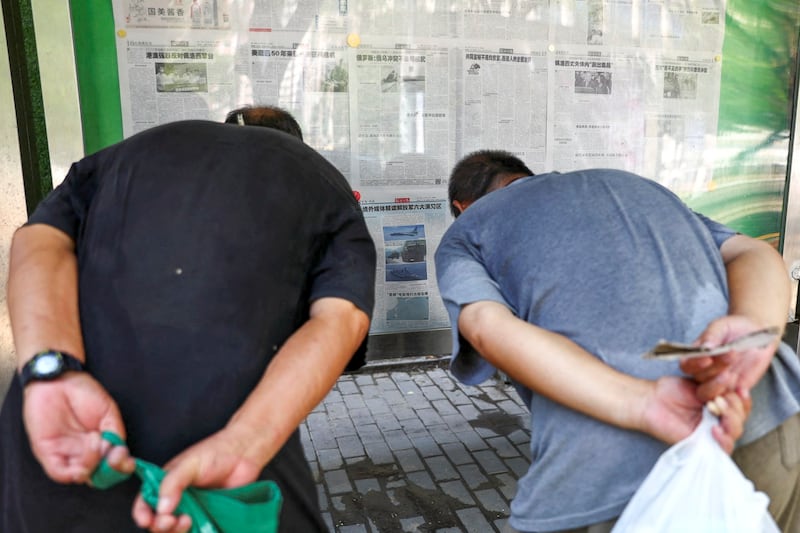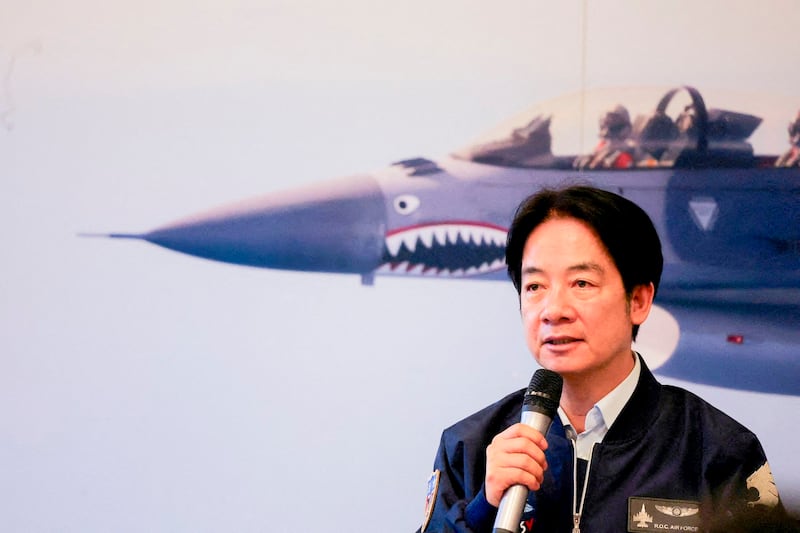China on Friday warned that supporters of independence for Taiwan could be tried in absentia and sentenced to death for "splitting the country," in a move designed to step up pressure on the democratic island.
China's law enforcement agencies and courts should "severely punish Taiwan independence diehards for the crimes of splitting the country and inciting secession ... and resolutely defend national sovereignty, unity and territorial integrity," a directive issued Friday by the Supreme People's Court and four other law enforcement agencies said.
While those agencies have no jurisdiction in Taiwan, the directive targets anyone working to further formal statehood for a Taiwanese republic, including holding a referendum, promoting the island's membership in international organizations, or “colluding with foreign forces” to promote independence.
Taiwan National Party Vice Chairman Yang Chih-yuan was detained in August 2022 under China's national security law as U.S. House Speaker Nancy Pelosi left Taiwan following a trip that angered China, which launched several days of wargames around the island in response.
Yang was arrested by state security police in the southeastern coastal Chinese city of Wenzhou and accused of having founded the pro-independence Taiwan National Party, with the aim of "promoting Taiwan to join the United Nations as a sovereign and independent country."
Riskier to travel?
Analysts said Friday’s move could now make it much riskier for Taiwanese to travel to China or to countries willing to engage in extradition or unofficial renditions at Beijing’s request.
While only Taiwan's leaders are likely to run afoul of the ruling on independence referendums, the directive warns that anyone who denies China's territorial claim on Taiwan in the media, or through education or cultural activities could also be targeted.

Anyone who openly organizes in favor of an independent Taiwan could also be targeted for "active participation in secessionist activities," the directive said.
The announcement comes after dozens of Taiwanese artists and actors publicly endorsed Beijing's territorial claim on the island by retweeting a Chinese state media post in support of eventual "unification."
That tweet was a response to the inauguration speech of Taiwan's elected President Lai Ching-te, who called on Beijing to stop threatening his island, and respect the will of its people, the majority of whom have no wish to be ruled by the Chinese Communist Party.
Lai, who was Beijing's least favored candidate in January's presidential elections, warned on Sunday that China is currently the biggest threat facing Taiwan, which has governed its own affairs as the 1911 Republic of China since the Kuomintang nationalists under Chiang Kai-shek fled to the island after losing a civil war with Mao Zedong's communists in 1949.
Anyone who takes part in a pro-independence organization or helps to finance its activities "shall be sentenced to life imprisonment or imprisonment of 10 years or above for the ringleaders or those who commit serious crimes," with harsher treatment for anyone "colluding with foreign powers."

"Those who cause particularly serious harm to the state and the people and whose circumstances are particularly heinous may be sentenced to death," the document said, adding that trials may be held in absentia if targets are overseas.
There is no retroactive cut-off point for the new regulations, meaning that defendants could potentially be prosecuted for words or deeds that happened before it took effect on Friday.
The document said that any pro-independence activists who "voluntarily abandon their stance" and make efforts to "mitigate or eliminate harmful consequences" could be treated leniently, or have charges against them dropped altogether.
‘Don’t be intimidated’
The Taiwan government's Mainland Affairs Council said the island's people have the freedom to do as they please within the framework of its legal system.
"Taiwan's 23 million citizens enjoy inalienable freedom, democracy and rights in accordance with the Constitution of the Republic of China," the council said in a statement.

"The authorities in Beijing have no jurisdiction over Taiwan at all, and the so-called laws and regulations of the Chinese Communist Party have no binding force on our people," it said. "The government calls on the people to rest assured and not be threatened or intimidated by the Chinese Communist Party."
The statement said the directive was an "extremely uncivilized and rude provocation that would seriously affect cross-straits exchanges."
Wu Chien-chung, an adjunct associate professor of politics at Taiwan's Soochow University, said the move was another example of Beijing's "long-arm" enforcement of its laws, far beyond China's borders.

The move will mean that it's now far riskier for Taiwanese to travel to China or countries allied to it. "The main risk will mean being particularly careful about traveling to China, or to places that have extradition agreements with China," he said.
He said the directive, which was jointly issued by the Supreme People's Court, the Supreme People's Procuratorate, the Ministry of State Security, the Ministry of Public Security and the Ministry of Justice, seeks to extend Chinese law enforcement to the whole world, as it could be applied to foreign nationals deemed to be supporters of independence for Taiwan.
Chen Wen-chia, director of the National and Regional Development Research Center at Taiwan's Kainan University, said the Chinese directive is a bid to influence Taiwanese politics from a distance.
Accompanied by ongoing Chinese military exercises around the island, it will increase tensions across the Taiwan Strait, Chen said, and could affect trade, investment and economic exchanges.
Translated by Luisetta Mudie. Edited by Malcolm Foster.
